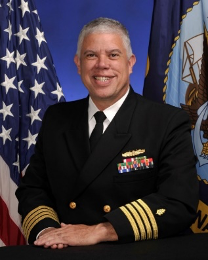Life as a Critical Care Physician on the USS Nimitz
By: CAPT Gilbert Seda, MD, PhD
January 22, 2021
In May 2020, I was told by my department head at Naval Medical Center San Diego that I had 1 day to pack my sea bag and deploy aboard the USS Nimitz. My wife and colleagues were shocked. After packing, I immediately reported to a hotel, where I remained in isolation for 2 weeks. After 15 days, I tested negative for COVID-19 and embarked on the nuclear-powered aircraft carrier, USS Nimitz, named after Fleet Admiral Chester W. Nimitz, who as Commander in Chief of the US Pacific Fleet had led the Allied air, land, and sea forces during World War II.
My mission was to lead a team of skilled professionals to support the Nimitz Medical Department in the event of a COVID-19 outbreak within the carrier strike group, consisting of the aircraft carrier, air wing, and escort ships. Specifically, our team was to provide additional critical care and COVID-19 testing capability to augment the ship’s medical staff and laboratory while afloat.
When I arrived on the Nimitz, I knew this was not going to be your typical Navy deployment. There were no shore visits to exotic destinations. All Sailors wore face coverings. Travel through the ship had specific routes. The galley had limited seating. The barber shops and gyms were closed, and all common spaces were disinfected three times a day. The few port visits we had were pierside with minimal contact from the outside world. As the ship maintained a COVID-19 negative “bubble,” many of these restrictions were later relaxed.

The USS Nimitz COVID-19 Response Team, from left to right: HM2 Sarah Freitas, General Hospital Corpsman; HM2 Eduardo Gaonazavala, Preventative Medicine Technician; HM3 Erique Lynn, Preventative Medicine Technician; HMC Chad Galvin, Respiratory Therapist; CAPT Gilbert Seda, Pulmonary, Critical Care, & Sleep Physician; LTJG Jonathan Stawicki, Environmental Health Officer; LT Anca Selariu, Microbiologist; LT Iliana Reyes, Critical Care Nurse; HM1 Ian Teves, Laboratory Technician.
To the credit of the Nimitz crew and its leadership, we have not had a single case of COVID-19. However, we remain vigilant that COVID-19 could get on board, and we have prepared for the worst scenario. We embarked with SARS-CoV-2 convalescent plasma, remdesivir, and corticosteroids on board; the ship has a three-bed ICU with three ZOLL® ventilators. We conduct drills and tabletop exercises to practice how the medical department would respond in the event of a COVID-19 outbreak. We practice contact investigations, and we developed an Influenza-Like Illness Clinic, which we implement every 2 weeks after pierside visits.
Although we have had no critically ill Sailors with COVID-19 at sea, we face overwhelming stressors. We are coping with one of the longest deployments at sea with no clear end date. We are enduring a long separation from those who are dear to our hearts. What is difficult for me as a critical care physician is watching from afar a nation in turmoil from an uncontrolled pandemic that has consumed critical care resources and taken many lives, health care disparities in our population, and a presidential election that has not united but divided the country. We are dealing with symptoms of burnout syndrome and compassion fatigue, which are natural consequences of prolonged stress.
Despite these significant stressors, I have the honor of working with an amazing group of health care professionals who are standing the watch 24/7, caring for a resilient group of Sailors and Marines who give 110% to their mission every day. My strength lies in the realization that I am in the company of a group of dedicated, professional officers and enlisted medical personnel in the Nimitz Medical Department who adapt, thrive, and survive in the face of adversity. It is a privilege to serve my country with my brothers and sisters at sea.
DISCLAIMER: The views expressed are solely those of the author and do not reflect the official policy or position of the US Army, US Navy, US Air Force, the Department of Defense, or the US government.
 CAPT Gilbert Seda, MD, PhD, is an Associate Professor of Medicine at the Uniformed Services University and Director of the Sleep Medicine Division at Naval Medical Center San Diego. He is currently the Director of the COVID-19 Response Team aboard the nuclear aircraft carrier USS Nimitz (CVN-68).
CAPT Gilbert Seda, MD, PhD, is an Associate Professor of Medicine at the Uniformed Services University and Director of the Sleep Medicine Division at Naval Medical Center San Diego. He is currently the Director of the COVID-19 Response Team aboard the nuclear aircraft carrier USS Nimitz (CVN-68).